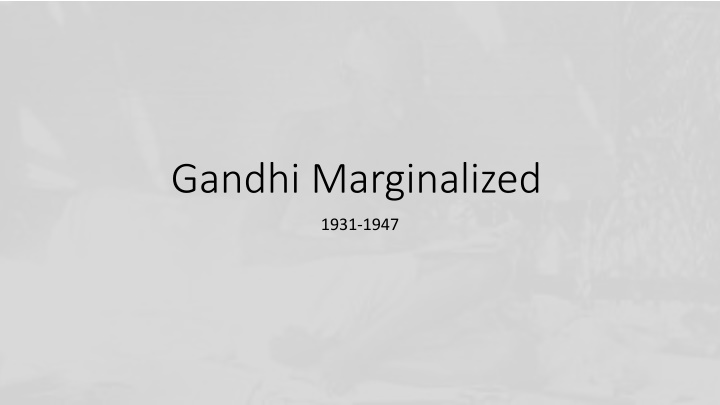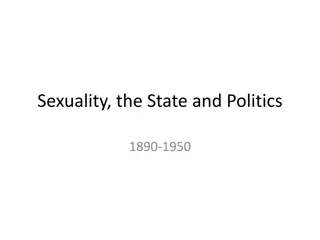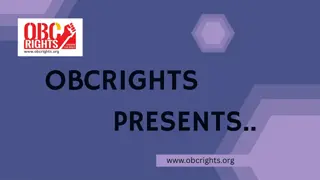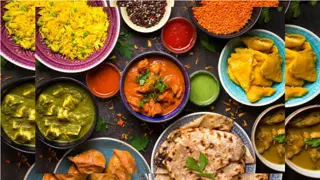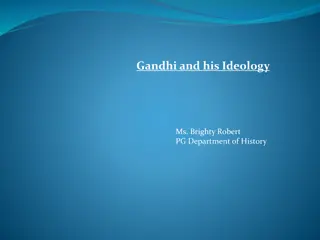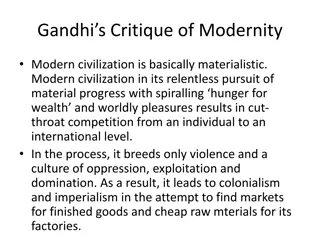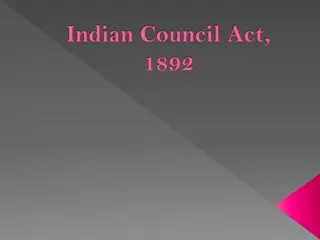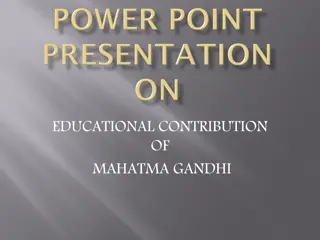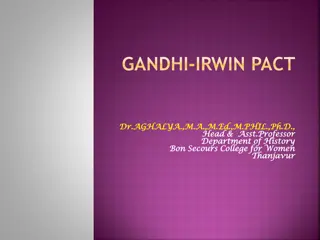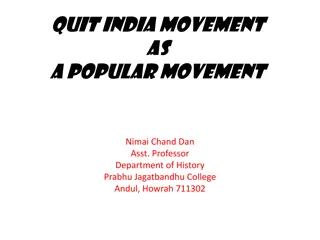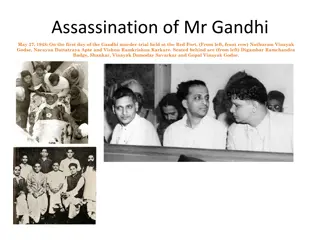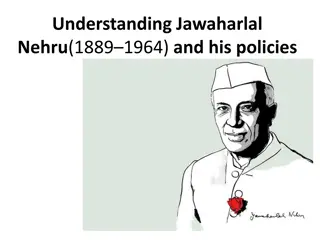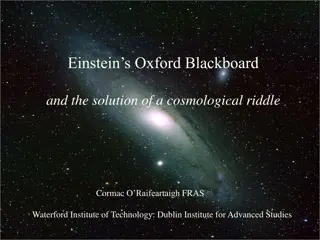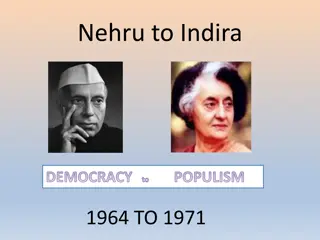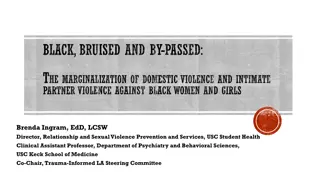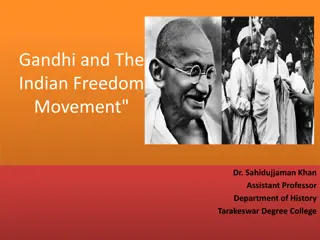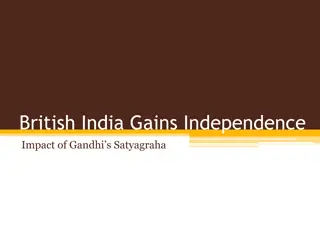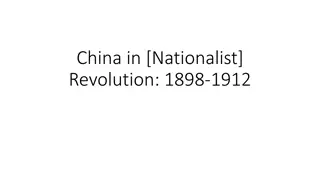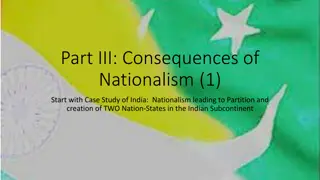Gandhi's Marginalization in Indian Nationalist Politics from 1931-1947
The 1930 Salt Satyagraha propelled Gandhi into the heart of nationalist politics, challenging colonial rule. However, by the end of the decade, the tide shifted away from his influence towards a more conventional political landscape dominated by power negotiations and elections, leading to Gandhi's marginalization. This shift paved the way for the politics that eventually resulted in the partition of India.
Download Presentation

Please find below an Image/Link to download the presentation.
The content on the website is provided AS IS for your information and personal use only. It may not be sold, licensed, or shared on other websites without obtaining consent from the author.If you encounter any issues during the download, it is possible that the publisher has removed the file from their server.
You are allowed to download the files provided on this website for personal or commercial use, subject to the condition that they are used lawfully. All files are the property of their respective owners.
The content on the website is provided AS IS for your information and personal use only. It may not be sold, licensed, or shared on other websites without obtaining consent from the author.
E N D
Presentation Transcript
Gandhi Marginalized 1931-1947
Overview Statement of the problem or issue Context of the 1920s 1920s and other Actors in Nationalist Politics INC, left and right wings Ambedkar Revolutionary Terrorists 1930s, Salt March and Beyond. Gandhi s marginalization Gandhi s own complicity in marginalization, work as MOBILIZER and as BRAKE, stop-start Initiative to Colonial State Communal Award controversy, Gandhi and Untouchables 1935 Act and consequences
Statement of the issue 1930 Salt Satyagraha and Civil Disobedience movement puts Gandhi at the center of nationalist politics Non Cooperation and Civil Disobedience at a mass scale was threatening foundations of colonial rule Yet, by the end of the decade nationalist politics appeared to have moved away from the Gandhian paradigm all together It s all about elections, negotiations over power, who gets what, and how? Suits the British much more, because this is a politics they understand and can negotiate with much more easily than Gandhi s This marginalization also paves the way for the politics that leads to partition. But, more on that later
Context of the 1920s G calls off 1stNon-Cooperation/ Khilafat movement, after CHAURI CHAURA, February 1922 Two wings to the INC: SWARAJIST AND NO-CHANGER 1923. Swarajists seek elections to Legislative Councils and the "No Changers" follow Gandhi in constructive work in rural area. These were elections based on the 1919 Government of India Act, (Montague- Chelmsford Reforms). Limited in nature 1922 to 1927 Gandhi remains focused on village level work, promotion of khadi homespun cloth, etc. Two wings of INC come together in 1928 during agitation against the all-white Simon Commission 1928, INC issue the NEHRU REPORT, asking for dominion status 1929 During the Lahore session of the INC, declare for PURNA SWARAJ (complete independence) a significant change from Nehru Report
India in the 1930s Great Depression of the 1930s, impact all around, on peasants and even more so on factory workers Factories product of WW I, where disruption of shipping gave opportunities to Indian capitalists Success of Gandhi s SALT SATYAGRAHA is a product of this But then, in 1931, with no excuse of violence either, Gandhi calls off the movement Unlike the 1920s, now, there were more radical, socialist, organizations, pressing to go beyond the proposed no-tax campaigns to NO RENT campaigns Clear presence of LEFT in nationalist politics Organized left: CPI, begin in the 1920s, affiliated to Communist International and MOSCOW Independent left, though impressed by Soviet revolution, and Marxism, not Comintern. This was the Left WITHIN INC, e.g. Jawaharlal Nehru (JLN), Bose, trade union leaders, writers, poets, peasant leaders, members of the CSP, etc. Although independent left strength was growing, with leaders like JLN and Bose, they were a MINORITY within the INC, still dominated by elite, and more conservative right-wing leaders Right wing leaders WANT independence, but no real socio-economic change; want traditional hierarchies in place. Willing to enter councils, while the left, led by NEHRU and Bose and younger leaders, want change in all spheres
Divisions with the INC Division between left and right within INC threatened to break up INC after 1931 JLN critical of Gandhi throughout the mid 30s, but Gandhi, still the most important figure, retains his position above and over left and right, placates both groups Pushes for NEHRU as president , allow him to pass radical resolutions, e.g. at the KARACHI session of the INC (pledging the INC to radical agrarian reform after SWARAJ) yet at the same time effectively withholding support for the initiation of mass agitations to achieve these ends, which was the only way to make those resolutions a reality Also see, INC, left and right wings: Gandhi s role in debates over 1935 GoI Act (pp. 195-96)
Other Actors in Nationalist Politics Subhash Chandra Bose: Militant, Maverick, Fascist?? Bhimrao Ambedkar: Untouchable Highly educated, PhD from Columbia University, Law from London History of clashes with Gandhi back to 1931 (Round Table Talks) over who represents Untouchables Prefers the term Untouchable and sometimes Dalit (the oppressed or the broken) to Gandhi s label of Harijan (children of God) that Ambedkar finds patronizing Differences over approach to combating what both recognize as an evil and immoral system of discrimination Revolutionary Terrorists such as Bhagat Singh: Hindustan Socialist Republican Army. BHAGAT SINGH very popular, in 1930-31, even at peak of Gandhi s popularity. Arrested in 1929, inspired others, 1929 Chittagong Armory raid, 1930, Binoy Badal Dinesh attack the seat of British administration in Calcutta Not to forget, the still very important role played by the colonial state
Gandhis Marginalization: Own Complicity? Mobilizer and Brake, both major movement suggest this Salt movement had galvanized people, a full scale civil disobedience movement had been planned, also a no tax agitation in plan But, Gandhi, did not like movements going out of control, and as in 1922, calls off Salt Satyagraha in 1931 with Gandhi-Irwin Pact and attending the second Round Table Conference (RTC) in London in 1931 Why? Radicalism getting out of hand? Lack of control threaten UNITY? Gandhi had many options at this point, lots of negotiating points, could have included for instance, commuting of Bhagat Singh s death sentence, but not do so!! RTC fail, as expected, re-launch agitation, but not as successful this time
Gandhis role after 1932 Gandhi & Ambedkar: Communal Award and the Poona Pact (see Gandhi: Caste, Class, Gender slideset) Withdrawal from Nationalist politics and from INC after 1934 to focus on village level work Special focus on Harijan reform and the abolition of untouchability Alienation of Subaltern Groups Opportunity for Colonial State who follow up the Communal Award of 1932 with the Government of India Act, 1935 Greater opportunities for both opponents and supporters who were now free to play games of power politics (having abandoned non cooperation)
Gandhis Marginalization: An Opportunity For many on both left and right wings of INC, Gandhi s marginalization was an opportunity to acquire real political power within the colonial system The Government of India Act of 1935 is a great example of this For the colonial state this an opportunity to deal with folks who spoke their own language of power (divide and rule never work when there is non-cooperation) Paradigm of politics changes: More and more about who will get what, how, and when Shift from Gandhian politics to HIGH politics of negotiations that ultimately produces the partition of the subcontinent
1935 Act and the Pathway to Partition For details of provisions of 1935 Act, see pp. 195-96 For the first time, there would be elected majorities in assemblies, and franchise was expanded, though far from universal Allows the majority party to form a cabinet, have executive power Left-Right split in INC over accepting the 1935 Act and participating in elections Gandhi personally NOT in favor, more interested in Harijan affairs, reform upper caste Hindus and spiritual regeneration His logical position was with left, as favors rejection of Act and elections But Gandhi LEAVES INC, and as a result, the majority right wing dominates INC retains leftist rhetoric, but participates in the elections Earlier an opponent Nehru very enthusiastically involved in 1937 elections INC wins, forms governments in most provinces from 1937-1939 Muslim League routed in 1937 elections and realizes impossibility of defeating INC in all-India contest
